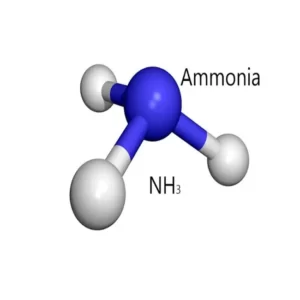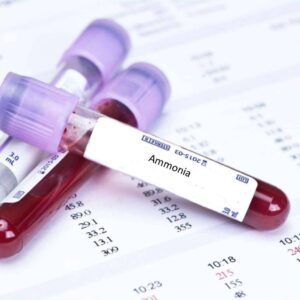What is ammonia?
Uses of Ammonia
Ammonia (NH3) is one of the most commonly produced industrial chemicals. It is used in industry and commerce, and also exists naturally in humans and in the environment. Ammonia is essential for many biological processes and serves as a precursor for amino acid and nucleotide synthesis. In the environment, ammonia is part of the nitrogen cycle and is produced in soil from bacterial processes. Ammonia is also produced naturally from the decomposition of organic matter, including plants, animals, and animal wastes.
Ammonia takes part in many chemical reactions. Ammonia reacts with strong acids to form stable ammonium salts: with hydrogen chloride, it forms ammonium chloride; with nitric acid, ammonium nitrate; and with sulfuric acid, ammonium sulfate. Ammonium salts of weak acids are readily decomposed into acid and ammonia. Ammonium carbonate, (NH3)2CO3·H2O, is a colorless-to-white crystalline solid commonly known as smelling salts; in water solution, it is sometimes called aromatic spirits of ammonia. Ammonia reacts with certain metal ions to form complex ions called ammines. Ammonia also reacts with Lewis acids (electron acceptors), e.g., sulfur dioxide or trioxide, or boron difluoride.
Some chemical/physical properties of ammonia are:
At room temperature, ammonia is a colorless, highly irritating gas with a
pungent, suffocating odor.
In pure form, it is known as anhydrous ammonia and is hygroscopic (readily absorbs moisture )
Ammonia has alkaline properties and is corrosive.
Ammonia gas dissolves easily in water to form ammonium hydroxide, a caustic solution, and a weak base.
Ammonia gas is easily compressed and forms a clear liquid under pressure.
Ammonia is usually shipped as a compressed liquid in steel containers.
Ammonia gas is easily compressed and forms a clear liquid under pressure.
Ammonia is not highly flammable, but containers of ammonia may explode when exposed to high heat.

Uses of Ammonia
Ammonia is a common word that you often hear in classes or simply when you are shopping for household goods. Besides, this chemical element has some interesting properties as well as many popular uses which we will be looking at on this page.
However, before we get down to the applications of ammonia let’s try and understand what this element is all about. So, ammonia is basically a colorless gas with a distinct pungent odor. It is found naturally in the environment mixed in air, soil, or water. It is also present in plants, animals as well as humans. Further, ammonia also called Azane is formed when Hydrogen and Nitrogen react. It comes with a molecular formula NH3. It is highly soluble in water. Apart from that, Ammonia is the second most manufactured substance in quantity after sulphuric acid in the world.
Common Uses of Ammonia
Talking about the uses of ammonia, it is the most important or building-block chemical and in the manufacture of products that people make use of every day. So let’s see where it is used. Ammonia in Industries, Agriculture, Household Products, For Manufacturing Various Compounds, Metal Treating, Petroleum.
Ammonia in Industries:
Ammonia is used extensively in several industries. It is used either as a stabilizer, neutralizer, or as a source of nitrogen to carry out several functions. Ammonia is used in wastewater treatment, leather, rubber, paper, food, and beverage industries. It also is used in cold storage or refrigeration systems and in the production of pharmaceuticals. Ammonia is used in the printing as well as cosmetics industries. It is also used in fermentation. When used as refrigerant gas and in air-conditioning equipment, ammonia can absorb substantial amounts of heat from its surroundings.
Ammonia can be used to purify water supplies and as a building block in the manufacture of many products including plastics, explosives, fabrics, pesticides, and dyes.
Ammonia also is used in waste and wastewater treatment, cold storage, rubber, pulp and paper, and food and beverage industries as a stabilizer, neutralizer, and a source of nitrogen. It also is used in the manufacture of pharmaceuticals.
Uses of Ammonia in Agriculture
Ammonia is used mainly in Agricultural industries. About 90 percent of all ammonia produced is used in this field. Since ammonia acts as a rich source of nitrogen and other elements, it is used in fertilizers to basically sustain food production. It is also used in the production of liquid fertilizer solutions consisting of compounds like ammonium nitrate, salts, urea, and others. And there’s more. Ammonia is often used as an antifungal agent on certain fruits and as preservatives.
Household Products
Ammonia is one of the main ingredients in a lot of household cleaning products. It is used as a cleaning agent and can be used to remove stains or clean mirrors, tubs, sinks, windows, and more. Some other uses include antimicrobial agents or antiseptics, and ammonia is also used as a fuel.
For Manufacturing Various Compounds
We find uses of Ammonia in the manufacturing of a number of compounds like nitric acid, Hydrogen cyanide, Ammonium carbonate, Phenol, Urea, Amino acids, and a lot of other items.
Metal Treating
Here dissociated ammonia is used in operations like carbonitriding, nitriding, furnace brazing, bright annealing, sintering, atomic hydrogen welding, and other operations.
Uses of Ammonia in Petroleum and Mining
In the petroleum industry ammonia is utilized in counterbalancing the acid constituents of oil which is in crude form. It also helps to keep equipment free from corrosion. Additionally, Ammonia is used in the mining industry for the extraction of several metals.
ARAX CHEMISTRY is a great manufacturer of Caustic Soda Flakes, Aluminum Sulfate, and Copper Sulfate which offers its High-quality products.


